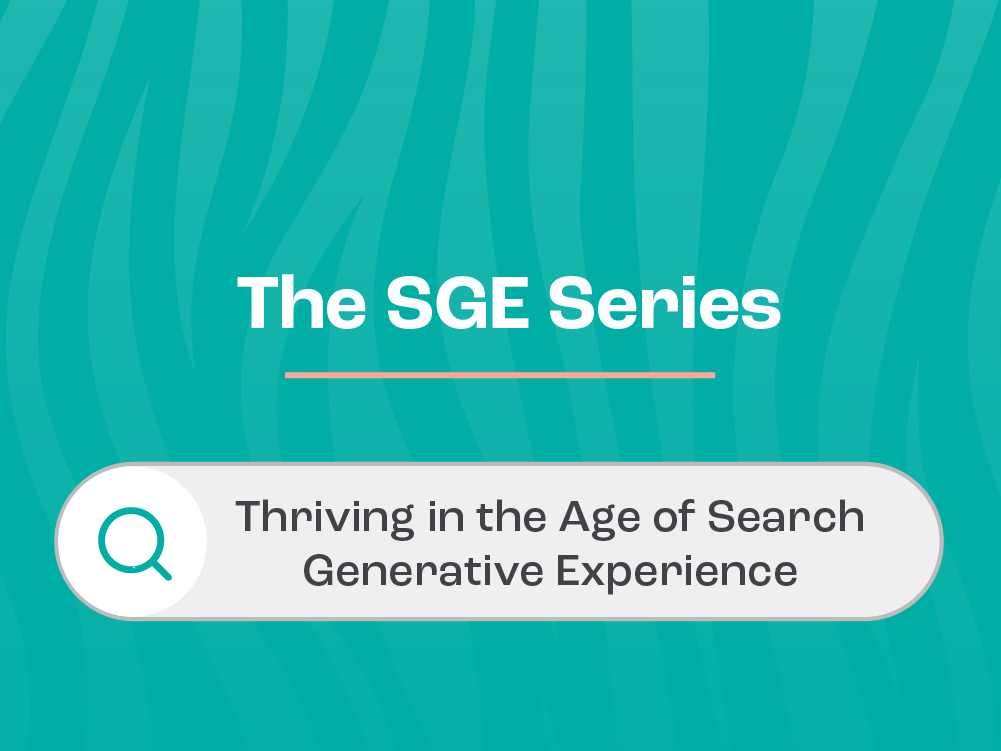
It’s no secret there is big change coming: the way we use search engines, focus our SEO efforts, and indeed measure search success is evolving as we speak.
That’s why every month, our SEO team will be pulling together an update in order to help you be as well prepared as possible for these major changes.
Kicking this series off is Digital Marketing Director, Sam Grant, tigerbond’s SEO expert with over 10 years of driving search engine rankings across a variety of industries.
We’ll include data from our testing, thought leadership and opinions from the greatest minds in search.
So, what do we know so far?
First off, unless you have access to Google’s Search Labs and you’re based in the USA, Search Generative Experience is a bit of an unknown right now.
What we do know is that Google is scrambling to deliver an AI solution that can rival and then beat ChatGPT.
Whilst it’s in its infancy as a search platform, Google is clearly concerned about losing search market share to Open AI.
From our testing, it’s clear that even Google isn’t 100% sure on what the final roll out of SGE will look like.
We’ve seen a number of different placements of the SGE experience, but what appears most likely is that SGE will look somewhat like a supercharged version of featured.

When will SGE get out of beta?
The short answer is, no-one knows, however based on the variable testing that Google’s conducting, it seems that Google is going to roll out updates in slow motion, allowing for testing and refinement of an experience that will revolutionise the way we search.
It’s likely that the experience will remain in beta for some of, and perhaps the entirety of 2024, with users being served different testing experiences in specific countries initially, whilst Google generates enough data to refine next steps.
How do we think it will affect traffic?
Million-dollar questions aren’t often easy to answer and there’s no exception here.
Based on Google’s most recent algorithmic updates and quality rater guidelines, content written for the sake of SEO seems the most likely sufferer, particularly content written for queries that can easily be answered without having to navigate beyond Google.
It’s likely that the heaviest impact will come at the top of the marketing funnel, with SGE more than capable of answering user queries at this point in the journey.
One thing that is clear is that measurement is going to be hit with similar levels of change too – at present there is no tracking in Google Search Console whatsoever, and it’s likely that this will remain the case for some time.
It’s the same story when it comes to Bing Chat.
How can I prepare my website and content?
Producing clear and engaging content that is within your niche is still going to be central to any ongoing search strategy.
If you’ve previously written content for the sake of driving rankings, it’s time to think about adapting this and any content you’re writing to Google’s latest quality rater Guidelines.
Experience, Expertise, Authoritativeness and Trustworthiness (more commonly noted as E.E.A.T) is clearly a move by Google to prep content creators for the changing experience.
Going forward, web content needs to focus on aligning to these four pillars and, perhaps more importantly, ensuring content provides a helpful answer to the user’s query.
In this case, Google’s Helpful Content Update offers another signpost on how to be prepared, however, it’s worth noting that Google’s advice has always been that helpful content will be rewarded with rankings.
Do I need to avoid using AI to create content?
Not necessarily, however, as we’ve discussed above, content for ranking’s sake should no longer spearhead search strategy.
There is no indication that Google is penalising AI-based content, but it’s worth thinking about what AI content lacks: brand-led writing style, human input, uniqueness, , and real-world experience to name a few.
In short, content purely based on AI is unlikely to meet the quality rater guidelines listed above.
Summary
Sometimes it’s easy to get caught up in the change that’s coming – taking a scroll through LinkedIn this morning, I would say about 75% of the content I’m looking at surrounds the extinction of search as we know it.
Of course, it’s important for all marketers and content creators to be aware of what’s going on in real time, but the truth is there’s still A LOT we don’t know here.
Sometimes, in the midst of change, taking a step back and focusing on what you know will remain consistent represents a better approach.
What we do know, and have always known, is that great SEO is centered around great content that your target audience finds both interesting and engaging.
Sticking to those guns will likely see you do better as the search world changes, no matter what that change looks like.
